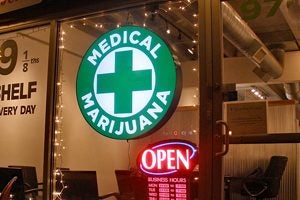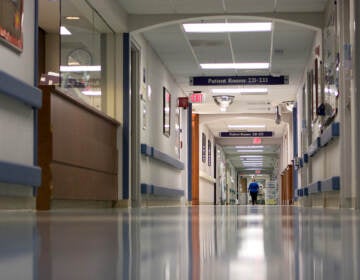Vaping and vaccines to forefront in 2019 healthcare debates
Enduring opioid epidemic, rising cost of prescription drugs and of health care overall are set to remain big issues for patients, providers and state officials.

In one year, vaping has increased nearly 80% among high school students and almost 50% among middle schoolers. (Nery Zarate/Unsplash)
Healthcare continued to make headlines in New Jersey and nationwide last year, over ongoing policy debates — like the increasingly partisan tussle over the Affordable Care Act and the evolving response to the opioid epidemic — and emerging topics, like the explosion of vaping among young people.
Perennial issues also received new attention, such as relatively bold proposals to curb the rising cost of prescription drugs. Many of these topics will continue to command attention in 2020, including the ACA, the debate over school vaccines, and the state’s efforts to expand access to medical marijuana.
The major issues, looking back and ahead, include:
Vaping explosion: The emergence of e-cigarette use — especially among young people — became a major public interest in 2019, as experts announced that some devices were causing lung injuries similar to chemical burns. Dozens of patients nationwide have died as a result, including a New Jersey woman. While the death rate connected to vapes remains relatively low, parents and policymakers were shocked to see that use of these devices had jumped nationwide nearly 80% among high school students and almost 50% among middle schoolers in one year alone.
The response was swift, in New Jersey and elsewhere. There were calls to ban flavored vaping products, which experts say attract children, and further regulate the sale of vape items, which is already banned here to those under age 21. Bills to do so are making their way through the state Legislature with vocal pushback from vape supporters, including adults who insist the products have saved them from smoking traditional cigarettes, which some argue are more dangerous.
Public health advocates see it differently. “Vaping has completely reversed the progress we made in reducing youth tobacco consumption — and what’s worse, emerging evidence indicates that youth are now experimenting with other forms of tobacco concurrently, at higher rates than recent years,” said former state health commissioner Dr. Shereef Elnahal, CEO of University Hospital in Newark, who has been a vocal critic of the vaping industry’s practices. “Simply put, vaping is big news to people because it is impacting youth in ways that are extremely concerning to public health.”
Strife over vaccines: There were rising rates in the region, including parts of New Jersey, of preventable diseases like measles that had been considered eradicated in the United States. That brought fresh attention to the use of vaccines, long considered a critical and effective public health tool worldwide. Attempts in the Garden State to eliminate the “religious exemption” for school-based vaccine requirements sparked a passionate backlash from some parents and others who said the proposed policy, which would only allow for specific medical exemptions, infringed on their freedoms in how to raise their children.

But public health officials argued that vaccine policy should not be shaped by personal choice alone, especially when it comes to protecting against potentially deadly diseases. State lawmakers pledged to push on in 2020 with legislation to tighten exemptions.
“This legislation is nothing less than an important public safety measure and nothing more than a reasonable and effective way to protect against the spread of infectious diseases,” said sponsors of the bill, state Sens. Loretta Weinberg (D-Bergen) and Joseph Vitale (D-Middlesex), who chairs the Senate health committee. “This is about keeping our future generations safe and healthy. Our personal health choices are not made in a vacuum. The decision to refuse vaccinations can have a real and immediate impact on the safety of others.”
Opioid epidemic: After years of bad news related to heroin and other opioid use in New Jersey, there may be a glimmer of hope. As of November, the state is on track to record at least 100 fewer drug-related deaths than it did in 2018, when more than 3,000 people died of opioids or other illegal substances, according to data collected by various agencies. And the number of opioids prescribed legally in the state continues to decline, reducing the risk that patients — or family members who raid their medicine cabinets — will become addicted.
Those who work on addiction issues suggest this trend also reflects a growing public awareness of the disease, some decline in the associated stigma as well as government and nonprofit efforts to expand access to treatment, recovery and support services. In 2019, the state worked to beef up proven treatment protocols by training doctors, enhancing insurance coverage, and giving first responders new tools to help those suffering an overdose. But despite these gains, the emergence of fentanyl — a powerful synthetic opioid now frequently added by dealers to heroin to make it more powerful, which creates a more deadly product — has fostered a new concern that is likely to grow in 2020.
Prescription drug costs: While it’s old news that prescription prices are rising, 2019 seemed to bring a tipping point in the response. Relatively bold proposals — to have government set prices, or negotiate directly with drugmakers — emerged at state and federal levels. U.S. Rep. Frank Pallone (D-NJ) spearheaded one proposal, prompting concerns from the pharmaceutical industry about the impact on competition, patient access to medicine, industry jobs and more. Major federal changes to control prices face an uphill battle for many reasons, but the issue is a priority for several Democratic presidential candidates, including Sen. Cory Booker (D-NJ).

Medical marijuana: While medical cannabis took a back seat in 2019 to the massive debate in Trenton over legalizing adult recreational use, the program continued to expand under guidance from state officials. Changes made over the past two years have allowed participation to nearly double — with more than 64,000 patients now signed up — and twice the number of doctors, now more than 1,000, available to prescribe the medicine. In December, the state announced it had permitted a seventh dispensary, with at least five more expected to come online in the years to come.
And the ACA: While the national health care law, often known as Obamacare, may not have been the top health care story in 2019 — after several years of dominating the headlines — the battle over this massive federal insurance program continued. In New Jersey, state officials assumed greater control over aspects of the initiative in an effort to protect coverage, prompt more competition among insurers and help control prices. And this will escalate further in 2020, as the state creates its own website and takes over additional roles in operating the ACA exchange, or online marketplace where nearly 300,000 residents now buy health insurance.
But health care advocates are concerned about a federal court decision in Texas (the case was remanded back to this court following a partial decision in December) that could impact the underlying structure of the program in critical ways, now that a higher court already determined key aspects of the law are unconstitutional. Depending on the outcome of the Texas case, New Jersey Citizen Action warned it could jeopardize health care for 800,000 state citizens and endanger $4.5 billion in federal funding the state now receives annually.
“Consumers shouldn’t be subjected to this continued uncertainty about the Affordable Care Act and threats to the law that would make health care more expensive and gut crucial protections for people with pre-existing conditions,” said New Jersey Human Services Commissioner Carole Johnson, noting that the Murphy administration has worked to counter these Republican-led efforts to end or reform the law.
“Any decision that ultimately reverses the ACA — in particular, Medicaid expansion, would be catastrophic to public health,” added Elnahal, explaining it would harm hospitals and other providers, particularly those that care for poor and vulnerable populations. “No single outcome in 2020 could worsen disparities more than the wholesale reversal of the ACA by our courts,” he said.
WHYY is your source for fact-based, in-depth journalism and information. As a nonprofit organization, we rely on financial support from readers like you. Please give today.




